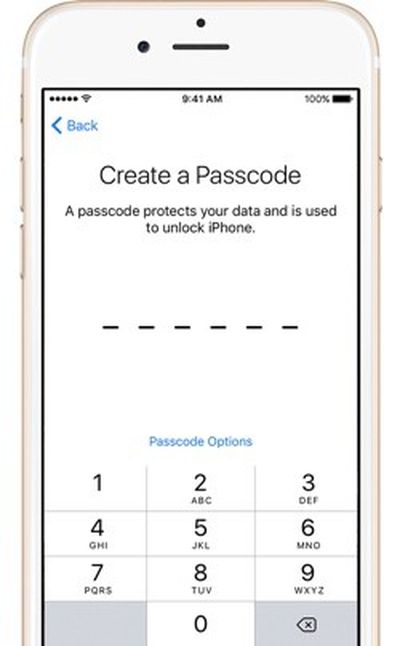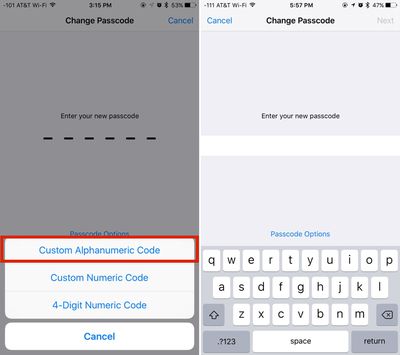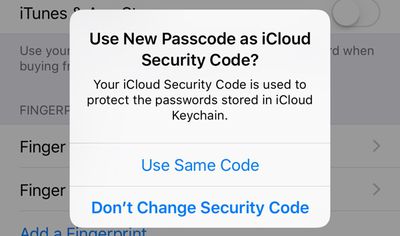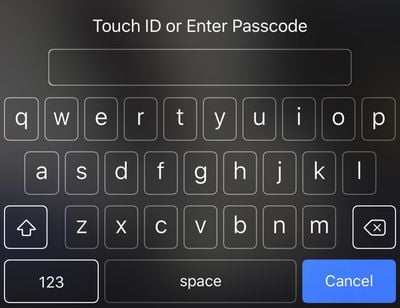What Is the Default Passcode for Iphone 5
 Apple's iPhones have long been protected by numeric passcodes, giving iOS users a way to protect keep their devices safe from hackers and prying eyes. Over the years, passcodes have been supplemented by Touch ID, Apple's fingerprint recognition system, but the passcode is still the iPhone's main line of defense.
Apple's iPhones have long been protected by numeric passcodes, giving iOS users a way to protect keep their devices safe from hackers and prying eyes. Over the years, passcodes have been supplemented by Touch ID, Apple's fingerprint recognition system, but the passcode is still the iPhone's main line of defense.
A passcode is required to set up Touch ID, and Touch ID is automatically disabled after 48-hours until a passcode is input by an iPhone or iPad's owner. In the United States, passcodes are especially important because the law suggests that while law enforcement officers can require you to provide a fingerprint to unlock a device, the same is not true of a passcode.
For a long time, passcodes were four-digit numeric codes by default, but with iOS 9, Apple began using a six-digit passcode as the default option. Six-digit passcodes offer 1 million possible combinations instead of 10,000, making a passcode harder to crack.
Apple doesn't advertise it, but the iOS operating system offers an option to make your passcode even more secure through the use of an alphanumeric passcodes or custom length numeric passcodes. Alphanumeric passcodes contain letters and numbers. Both alphanumeric and custom numeric passcodes can be much longer than four or six digits.
Passcodes are currently in the spotlight because of an ongoing security debate between Apple and the FBI. Apple has been ordered to help the FBI access data on the iPhone 5c owned by one of the shooters involved in the 2015 San Bernadino attacks.
To do so, the FBI has asked Apple to create software that would eliminate the iOS feature that erases an iPhone after 10 failed passcode attempts, removes the time limits between passcode entries, and allows passcodes to be input electronically. Apple is opposing this order and it's not clear how the issue will play out, but should the FBI gain a tool to access iPhones in this manner, it would take just upwards of a half an hour to break into a phone with a 4-digit passcode. With an alphanumeric passcode, such a tool would be next to useless because of the sheer amount of time it would take to guess a passcode with millions of possible combinations.
Creating an Alphanumeric Passcode
Creating an alphanumeric passcode is a process that can be done with a few taps and about five minutes of your time.

- Open the Settings app on your iPhone or iPad.
- Scroll down to "Touch ID & Passcode" and tap on it.
- If you already have a passcode enabled, you will need to enter it to access the passcode options.
- Select "Change Passcode" and enter your existing passcode again.
- At the screen where you're asked to enter a new passcode, tap on "Passcode Options" located just above the numbered.
- Choose "Custom Alphanumeric Code." You can also select "Custom Numeric Code" for a number-only passcode.
- Enter your chosen passcode. It can include numbers, letters, and symbols.
- Tap "Next."
- You'll be prompted to enter the same passcode again to verify the spelling. Enter it again and tap "Done."
After entering an alphanumeric passcode or changing your passcode, Apple will prompt you to use the new passcode as your iCloud Security Code, which is used to protect passwords stored in iCloud Keychain. Click on "Use Same Code" to change it or "Don't Change Security Code" to continue using your old passcode.

With an alphanumeric passcode set on an iPhone, instead of a number pad to enter a numeric passcode, you'll see a full QWERTY keyboard complete with access to numbers, letters, and symbols.

While not as convenient as a simple number code, an alphanumeric password can be harder to crack and just as easy to remember if you use randomly generated combinations of words. For example, "sarcasm-blacken-guilder-epilepsy" or "stitch-quasi-peppery-tuneless," two password phrases generated by 1Password, aren't difficult to remember because they're simple words, but with upwards of 29 characters, they're impossible to guess or brute force. Using an alphanumeric passcode will be more of a hassle than a standard passcode, but with Touch ID, a passcode doesn't need to be entered too often.
Any alphanumeric code used to protect an iPhone should be unique set of words or numbers that are not used for other products, services, or websites, which will make it impossible to obtain through social engineering or phishing attempts.
Related Stories
Apple Releases iOS 15.1.1 With Call Improvements for iPhone 12 and 13 Models
Wednesday November 17, 2021 10:20 am PST by Juli Clover
Apple today released iOS 15.1.1, a minor update that comes almost a month after the launch of iOS 15.1. The iOS 15.1.1 update can be downloaded for free and the software is available on all eligible devices over-the-air in the Settings app. To access the new software, go to Settings > General > Software Update. According to Apple's release notes, iOS 15.1.1 improves call drop performance...
Apple Releases watchOS 8.1.1 With Fix for Apple Watch Series 7 Charging Issue
Thursday November 18, 2021 10:14 am PST by Juli Clover
Apple today released watchOS 8.1.1, a minor update to the watchOS 8 operating system that came out in September. watchOS 8.1.1 comes three weeks after the launch of watchOS 8.1, an update that added SharePlay Fitness+ group workouts and other features. watchOS 8.1.1 can be downloaded for free through the dedicated Apple Watch app on the iPhone by going to General > Software Update....
Apple Updates AirPods Pro Firmware to Version 4A402 and AirPods 3 Firmware to 4B66
Tuesday November 16, 2021 11:34 am PST by Juli Clover
Apple today released a new 4A402 firmware update for the AirPods Pro, which is up from the prior 4A400 firmware that was released back in October. Apple has also updated the AirPods 3 firmware to 4B66, up from the 4B61 that was previously available. Apple does not offer information on what's included in refreshed firmware updates for the AirPods, so we don't know what improvements or bug ...
Only a 'Small Fraction' of iPhone Users Will Use Self Service Repair Program, Study Suggests
Very few iPhone users will repair their own iPhone to postpone their next smartphone purchase, despite the Self Service Repair program, according to research by Consumer Intelligence Research Partners (CIRP). Earlier this week, Apple announced the Self Service Repair program, giving customers who are comfortable with the idea of completing their own repairs access to Apple genuine parts,...
AAPL Stock Sets New All-Time High Following Latest Apple Car Rumors
Thursday November 18, 2021 10:13 am PST by Eric Slivka
Right on the heels of a fresh round of rumors about Apple's autonomous car project, Apple's stock price spiked to a new all-time high today, touching $157.87 per share before pulling back slightly. The previous all-time intraday high was set back on September 7 at $157.26, and Apple's stock is now up over 21% so far in 2021 and 33% over the past twelve months. Investors are no doubt...
Black Friday Spotlight: Target Offers $15 Gift Card With Purchase of $100 Apple Gift Card
We've been tracking early Black Friday deals in our dedicated Black Friday Roundup, and in an effort to prepare our readers for the big shopping event we're highlighting sales store-by-store in the lead-up to November 26. Note: MacRumors is an affiliate partner with Target. When you click a link and make a purchase, we may receive a small payment, which helps us keep the site running....
Apple Announces Self Service Repair Program, Starting With iPhone 12 and 13
Apple today announced the "Self Service Repair" program, allowing users to complete their own repairs via a new online store dedicated to parts and tools. The Self Service Repair program will give customers who are comfortable with the idea of completing their own repairs access to Apple genuine parts, tools, and manuals, starting with the iPhone 12 and iPhone 13 lineups. The scheme will be...
What Is the Default Passcode for Iphone 5
Source: https://www.macrumors.com/how-to/create-a-more-secure-passcode-on-ios-devices/